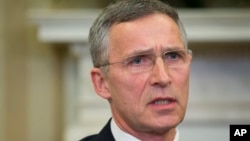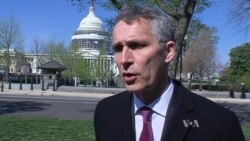NATO is preparing to step up its response to Islamic State and a more assertive Russia responsible for aggressive actions in Ukraine.
NATO Secretary-General Jens Stoltenberg spoke with VOA's Serbian Service about the alliance's future this week in Washington.
“That is the two main challenges we face and they are very different. But at the same time we have to be able to both face the challenges from the Southern Flank, from the Middle East/North Africa and at the same time face the challenges posed by Russia to the East. And what we are doing is we are implementing the biggest reinforcement to our collective defense since the end of the Cold War,” he said.
NATO is neither seeking confrontation with Russia nor a cold war, Stoltenberg said, but rather a dialogue to avoid incidents like the downing of the Russian plane over Turkey. He added that in the event of something like that happening, NATO can help keep it from spinning out of control.
Stoltenberg said NATO is implementing the biggest reinforcement to its collective defense since the end of the Cold War in response to the new security environment in the east of Europe and in the Middle East and North Africa.
He stressed the importance of different kinds of transparency, risk-reduction mechanisms to avoid difficult situations becoming even more difficult.
WATCH: Excerpt of VOA Serbian service interview with Stoltenberg
Meeting with US leaders
Stoltenberg is consulting with U.S. leaders before the Warsaw NATO Summit in July, where the refugee crisis in the Middle East and Europe is expected to be high on the agenda.
The NATO chief said the alliance has deployed ships to the Aegean Sea to assist with the crisis. He said the ships are not there to turn back boats with migrants and refugees, but are providing surveillance, reconnaissance, and monitoring.
Stoltenberg added NATO is sharing the information with the Turkish Coast Guard, with the Greek Coast Guard and the EU Border Agency Frontex.
WATCH: Full VOA interview with NATO Secretary-General Stoltenberg






